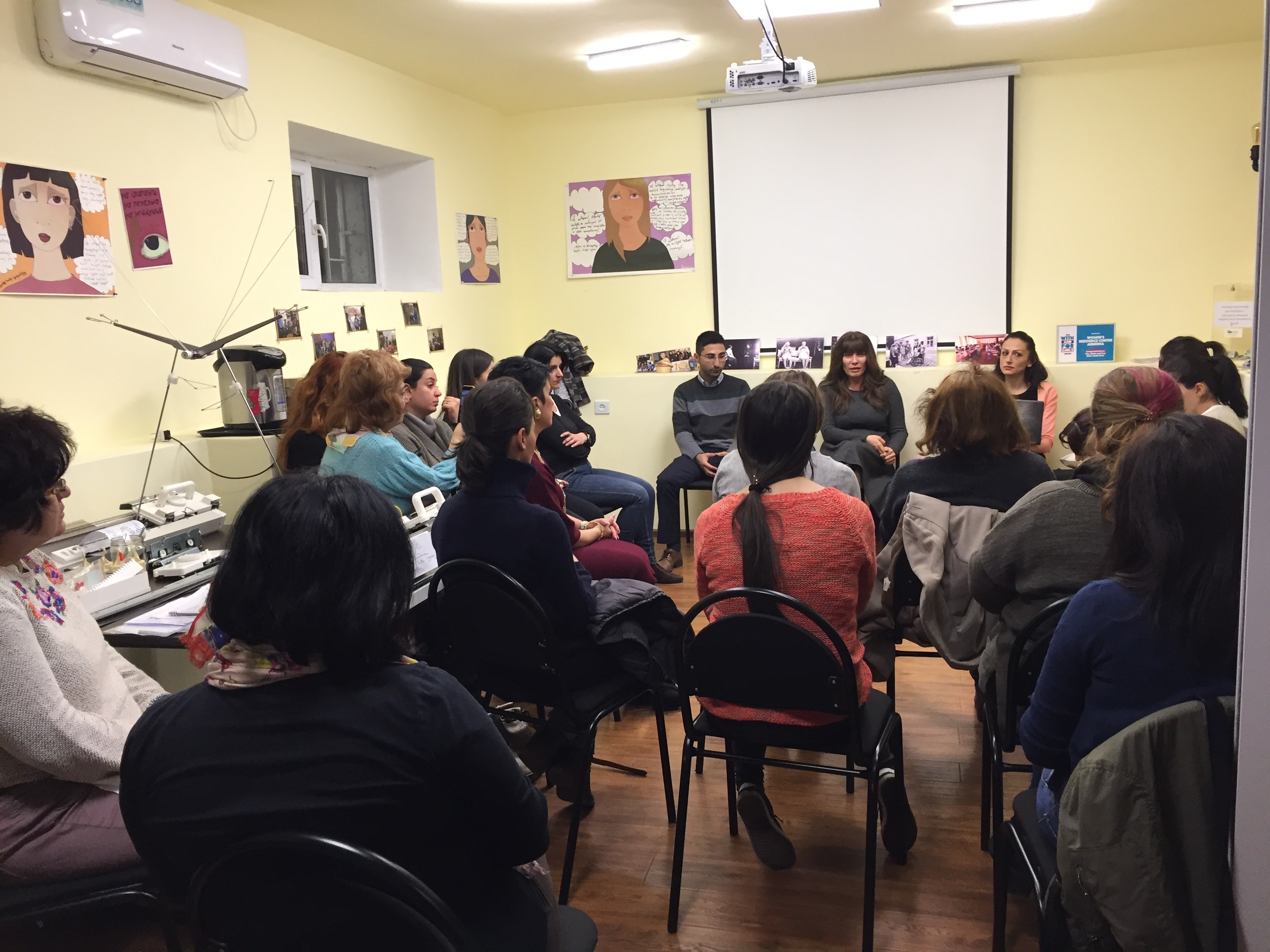By Sareen Habeshian
In weeks leading up to Armenia’s snap parliamentary elections, the Women’s Resource Center of Armenia is hosting weekly public meetings called “Women’s Vote,” where they invite parliamentary candidates to have an open discussion. During the meetings, candidates, organizers and attendees discuss party platforms and concerns regarding violence against women, poverty reduction and women’s health issues.
The first guest of the “Women’s Vote” open forum, on November 21, was Lusine Haroyan from the National Progress Party. Haroyan is the only woman to be the first-choice candidate of a party in the upcoming elections. The newly established party has the highest percentage of female candidates among all the political parties participating in the elections, with 43 out of 83 candidates, or 52 percent, being women.
 At the forum, Haroyan was asked about what she and her party intend to do about the issue of domestic violence in the country.
At the forum, Haroyan was asked about what she and her party intend to do about the issue of domestic violence in the country.
“When women report cases of domestic violence, yes, it’s true that sometimes the investigator comes and convinces her not to,” Haroyan said at the forum. “We see this issue. We think this is connected to education.”
Hourig Attarian, assistant professor at the American University of Armenia (AUA), says that although policy is vital for stopping violence against women, education is even more important.
“The most important issue, through formal and informal education, is to examine the root of these stereotypes, and start dismantling them,” she said.
The education system itself, however, also operates with stereotypes, added Attarian, who teaches a gender and social change course at AUA.
“Even textbooks from the independence era are replete with stereotypes, like in math problems where the women are doing housework,” she said.
Attarian attributes the lack of education and the resulting stereotyping and internalizing, to be one reason why women do not participate in Armenia’s politics as much as men do.
In a country where women make up more than 50 percent of the population, many of the parties have the minimum number of female candidates that the law mandates. Article 133, Paragraph 14 of Armenia’s Electoral Code states that no party or alliance can have more than 75 percent of a given gender in their candidate lists. In practice, this means that 25 percent of each party’s candidates must be women. In 2021, the minimum for the quota will increase from 25 percent to 30 percent. The Central Electoral Commission (CEC) is in charge of enforcing the mandate.
Lilia Hakobyan, head of the legal department at the CEC, said if a party does not meet the quota, the CEC will notify them and allow them 48 hours to fix their candidate list. If they then do meet the quota, they may participate in the elections. If they do not, the party will not be allowed to participate.
 Following the National Progress Party, the Citizen’s Decision Social-Democratic Party has the second most female candidates, with 35 out of their 82, ot 43 percent. The Rule of Law Party comes next, with 50 out of 130 candidates being women, or 38 percent. Then comes the Sasna Tsrer Party, with 64 out of 174, or 37 percent; next the Republican Party of Armenian with 45 out of 125, or 36 percent; then the Christian-Democratic Rebirth Party with 27 out of 85, or 31 percent; Prosperous Armenia Party with 51 out of 170, or 30 percent; Bright Armenia Party with 44 out of 156, or 28 percent; My Step Alliance with 48 out of 182, or 26 percent; Armenian Revolutionary Federation (ARF) with 39 out of 152, or 25 percent; and We Alliance with 34 out of 134, or again 25 percent.
Following the National Progress Party, the Citizen’s Decision Social-Democratic Party has the second most female candidates, with 35 out of their 82, ot 43 percent. The Rule of Law Party comes next, with 50 out of 130 candidates being women, or 38 percent. Then comes the Sasna Tsrer Party, with 64 out of 174, or 37 percent; next the Republican Party of Armenian with 45 out of 125, or 36 percent; then the Christian-Democratic Rebirth Party with 27 out of 85, or 31 percent; Prosperous Armenia Party with 51 out of 170, or 30 percent; Bright Armenia Party with 44 out of 156, or 28 percent; My Step Alliance with 48 out of 182, or 26 percent; Armenian Revolutionary Federation (ARF) with 39 out of 152, or 25 percent; and We Alliance with 34 out of 134, or again 25 percent.
Lara Aharonian, director of the Women’s Resource Center in Yerevan and board member of Human Rights House Yerevan, says that without the quotas, women would not have a presence in parliament.
“Because of quotas, we now have several women who are able to be in parliament,” she said. “But it’s not enough because in society the gender roles are still very rigid.”
The lack of representation of women in leading roles of government leaves out diverse perspectives and voices on all issues, ranging from politics to legislation that protects women from violence.
Only one party and one alliance mention initiatives for the protection or equality of women in their party agendas. The Citizen’s Decision Social-Democratic Party calls for regulatory mechanisms for the social protection of women. The My Step Alliance, which has the third lowest percentage of female candidates, claims it will continue to make efforts to establish new social, political and legal relations in the country based on several imperatives, which include the notion that all people – men and women – are equal before the law.
“It can be domestic violence, childcare, work, reproductive rights, any issue,” Aharonian said. “But we need to develop this culture of understanding among politicians that they need to address their women population.”
















